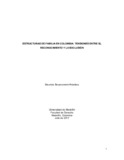Estructuras de familia en Colombia: tensiones entre el reconocimiento y la exclusión

Ver/
Compartir este ítem
Fecha
2017-11-09Autor
Bocanument-Arbeláez, Mauricio
Citación
Metadatos
Mostrar el registro completo del ítemDocumentos PDF
Resumen
La familia ha sido considerada como el núcleo fundamental de la sociedad y una de sus instituciones más importantes, por lo tanto se encuentra influenciada por los cambios que se presentan en diferentes factores como la cultura, la política, la economía, la democracia, la globalización, la tecnología, entre otros. En consecuencia la estructura de la familia regulada en el Código Civil colombiano de 1887 no coincide con las estructuras que actualmente se presentan, y los cambios que se han presentado normativa y jurisprudencialmente han sido lentos, quedando excluidas las estructuras familiares emergentes que durante el transcurso del tiempo se presentan socialmente y que son diferentes a la estructura monogámica, tradicional, heteronormativa y binaria. Con base en los enfoques de crítica-social, derecho en acción, derecho en contexto y la dogmática como ejercicio explicativo, se propone un concepto dogmático de familia no binario, con una mayor importancia en cuanto a los roles y funciones que la familia cumple en la sociedad, flexible para que se ajuste a las estructuras emergentes con mayor facilidad, incluyente para permitir que se materialice la ciudadanía plena, la ciudadanía sexual y el reconocimiento a la diversidad afectiva, y que cambia del paradigma de la tolerancia por el de la inclusión y el derecho a la igualdad. The family has been considered as the fundamental nucleus of society and one of its most important institutions, therefore it is influenced by the changes that occur in different factors such as culture, politics, economy, democracy, globalization , technology, among others. Consequently, the structure of the family regulated in the Colombian Civil Code of 1887 does not coincide with the structures currently presented, and the changes that have been introduced normatively and jurisprudentially have been slow, leaving out the emergent family structures that during the course of the time they present themselves socially and that are different to the monogamous, traditional, heteronormative and binary structure. Based on the approaches of social critique, law in action, law in context and dogmatics as an explanatory exercise, a dogmatic concept of non-binary family is proposed, with greater importance in terms of roles and functions that the family fulfills in society, flexible so that it adjusts to emerging structures more easily, inclusively to allow full citizenship, sexual citizenship and recognition of affective diversity to materialize, and that changes from the paradigm of tolerance to that of inclusion and the right to equality.
Colecciones
- Tesis [686]

